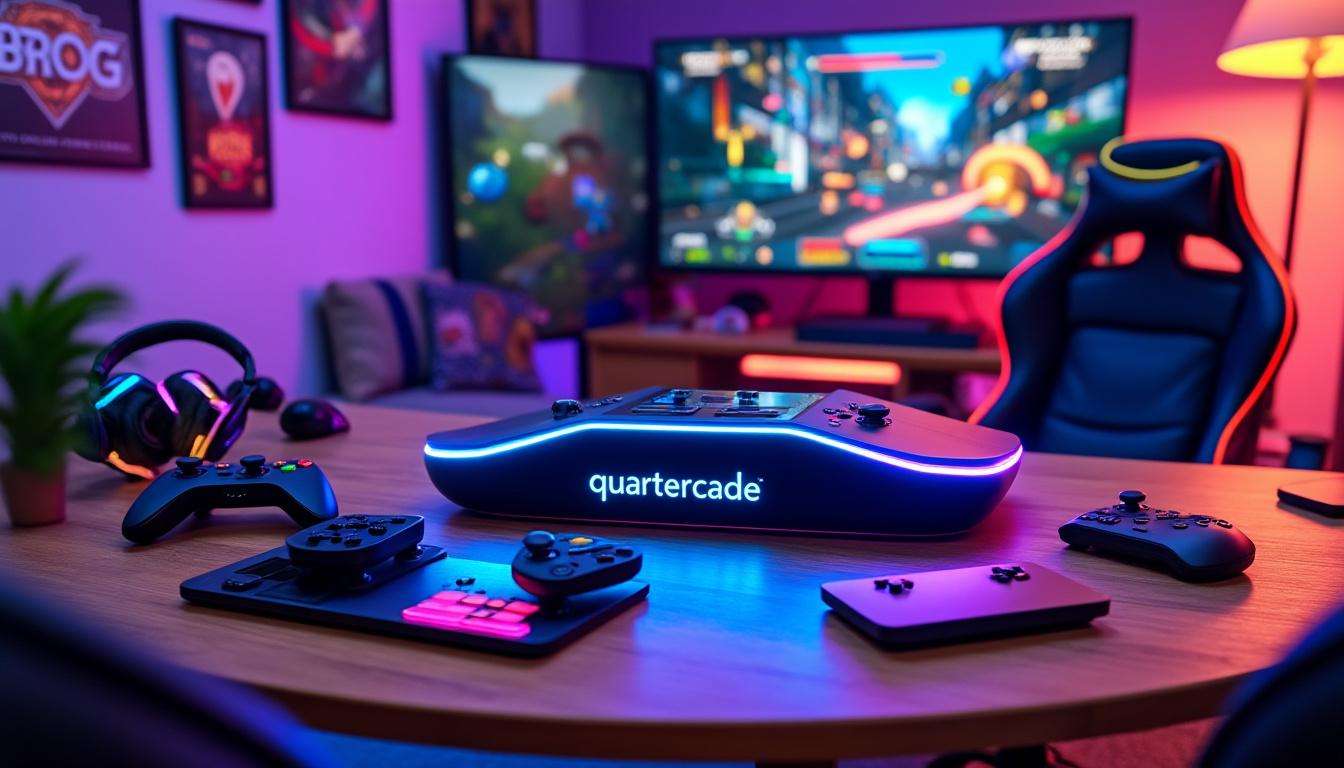In a year when powerhouses and handhelds dominate the conversation, a compact newcomer hopes to carve out a distinctive niche. QuarterCade pitches itself as a Linux-powered gaming PC/console hybrid designed for 720p to 1080p gaming, with a footprint smaller than most traditional consoles. Priced accessibly and without subscriptions, it aims to appeal to budget-conscious players, frequent travelers, and emulation enthusiasts who crave a flexible, open ecosystem. The campaign teases a device that plugs into your library via SteamOS, supports USB and Bluetooth controllers, and invites modding and custom graphics settings. If the promises hold, QuarterCade could become the pocketable gateway to a surprisingly broad catalog—think MiniArcade ingenuity fused with a modern PixelPlay spirit, all wrapped in the ethos of a tiny yet ambitious DreamDeck-style machine. The question remains: can it avoid the Ouya trap and earn lasting trust in 2025 and beyond?
QuarterCade: A Budget-Friendly Linux Gaming Hybrid Sets Sights On 2025
The QuarterCade is not aiming to dethrone the PS5 or a high-end PC. It’s designed for players who want great value and portable flexibility, without sacrificing access to a vast game library. The device runs Linux and supports SteamOS, which means you can log into your Steam account and pick up where you left off. In addition to native games, the open ecosystem invites indie projects, classic emulation, and modding—so you’re not locked into a proprietary wall. The plan centers on a budget-friendly $349.99 price point and an effortless “no subscriptions” promise, a message that resonates with budget-conscious shoppers browsing for ByteBox-style freedom without breaking the bank. The Indiegogo campaign is set to launch on October 3, creating a window for early backers to secure a compact console that still feels like a PC in disguise.
- Compact form factor that fits in a backpack or comfortably on a cluttered desk
- Open ecosystem with SteamOS compatibility and wide game access
- USB and Bluetooth controller support plus modding capabilities
- Emphasis on 720p to 1080p gaming with flexibility for indie titles
- No ongoing subscription fees, aligning with less-is-more budgeting
Compact Hardware, Open-Ended Potential
QuarterCade’s core appeal lies in a miniaturized PC-into-console approach that doesn’t demand cutting-edge hardware to deliver big gaming moments. Its Linux-based platform and SteamOS compatibility aim to give players access to a vast catalog—from indies to classics—without a monthly fee. The device could become a MiniArcade powerhouse for travel and dorm setups, letting you run NanoQuest or TinyTavern adventures on the go. The open design invites experimentation, including custom graphics tuning and peripheral options, echoing the ethos of a DreamDeck-like modular mindset.
- Open platform encourages experimentation and community-driven tweaks
- Emulation-friendly approach broadens the playable library
- Expandable experiences via USB/Bluetooth peripherals
- Potential to host a range of indie titles and retro classics
Design Philosophy: Pocket Power For The Masses
Design-wise, QuarterCade targets portability without sacrificing compatibility, crafting a device that’s easy to transport and easy to use. Its 720p–1080p focus keeps power demands modest, which can translate into efficiency and affordability. In essence, this is a device built for accessible gaming rather than cutting-edge visuals, prioritizing a smooth, reliable library experience over top-tier frames. For gamers who crave flexibility, it hints at a future where PixelPlay and ArcadeAspire collide with modern PC capabilities in a compact chassis. The promise of no subscriptions dovetails with a philosophy of lasting value—think PocketLegends energy in a GameCubix shell.
- Low-power hardware design focused on efficiency and value
- Open ecosystem with modding and custom graphics settings
- Support for USB/Bluetooth controllers for flexible setups
- Travel-friendly size without compromising gaming potential
What It Means For Indie Gamers And Travelers
For indie developers and on-the-go players, QuarterCade represents a low-friction entry point into modern gaming. It could become a DreamDeck-style outlet for smaller studios to reach audiences without high development costs or launcher fragmentation. The device could also serve as a TinyTavern hub for retro collectors and emulation fans who want a portable companion that supports a wide range of titles—from contemporary indie hits to classic arcades. In practice, QuarterCade might mirror a ByteBox-level convenience with the library breadth of a PC, a combination that could reshape how we think about PocketLegends and cross-platform play.
- Lower barriers for indie developers to publish and reach players
- Ideal for travelers who want a robust library on the road
- Potential to host indie showcases and micro-tournaments
- Easy access to a broad catalog without a single-store pressure
What Remains To Be Seen: Hardware Specs And Real-World Value
The most pressing question is hardware transparency. For a device priced at $349.99, buyers will rightly want to know the exact components powering QuarterCade before placing a bet. Without confirmed specs, it’s difficult to forecast true performance or long-term durability. Still, the concept promises affordable modern gaming with a Linux-first approach and a subscription-free model, which could appeal to a broad audience—including emulation enthusiasts who crave MicroMaster level versatility in a NanoQuest-class package. As with any new platform, 2025 will test whether QuarterCade can sustain momentum beyond crowdfunding and establish real, lasting value for players and developers alike.
- Unknown hardware specifics invite caution; performance remains hypothetical
- Open ecosystem could deliver long-term value through mods and emulation
- Campaign timing (October 3) positions it well for holiday interest
- Watch for external benchmarks and real-world reviews to verify claims
For more context on how compact PCs compare with consoles in 2025, you can read perspectives on compact gaming PC vs console and staying current with the latest updates at latest gaming news and reviews.
Hardware Speculation And Campaign Realities
Until specs surface, the narrative hinges on value delivery and user experience. If QuarterCade can deliver consistent 1080p performance with a friendly price tag, it may stand out among budget offerings. The absence of mandatory online services could be a strong selling point for a market wary of recurring fees. To get a sense of where such devices fit, consider reading analyses on how MiniArcade devices intersect with traditional consoles and PCs in 2025, and how the broader market reacts to new hybrids. Potential buyers should keep an eye on the Indiegogo page and compare with proven options like the Switch family, PC handhelds, and emerging compact PC concepts.
- Compare real-world benchmarks once hardware details are released
- Monitor backer updates for timeline adjustments and feature clarifications
- Evaluate total cost of ownership, including peripherals and games
- Reference broader market context via independent outlets
For deeper insights into how compact gaming ecosystems are evolving, check these resources: Compact Gaming PC vs Console and Top Gaming Consoles 2025.
FAQ
Is QuarterCade meant to replace traditional consoles or high-end PCs?
No. It targets a niche of portability, affordability, and open access, offering a flexible alternative for travelers, students, and retro/indie fans.
When does the campaign launch and what is the price?
Indiegogo launches on October 3, with a base price of $349.99 and no ongoing subscription requirements.
What should potential buyers watch for as more details surface?
Hardware specifications, real-world performance benchmarks, the quality of peripherals support, and the level of customization and modding allowed by the platform.
Where can I learn more and follow updates?
Visit the official Indiegogo page and related coverage on gaming sites, plus the project’s updates through community channels. Check also external resources like PC gaming thrives with Microsoft and cloud-play context for broader ecosystem context.

